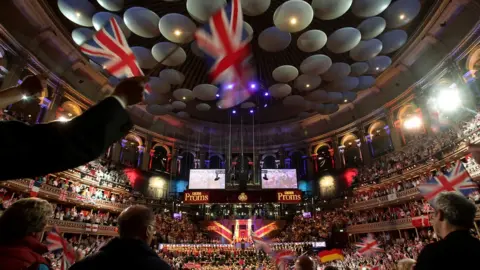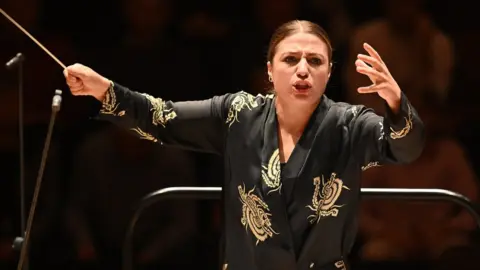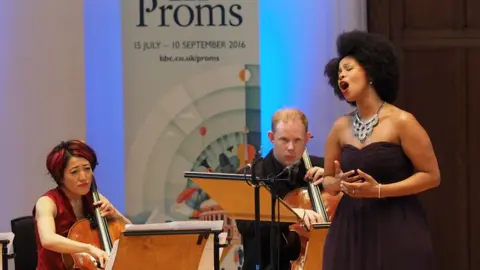Could the BBC Proms drop Rule, Britannia?
 PA Media
PA MediaRule, Britannia! and Land of Hope and Glory could be dropped from the Last Night of the Proms in the wake of the recent Black Lives Matter protests, according to reports.
The Sunday Times claims there are concerns at the BBC about associations with colonialism and slavery.
The Last Night of the Proms is due to take place on 12 September, but without an audience, due to coronavirus.
A government spokesman said they would leave any such decision up to the BBC.
However, Culture Secretary Oliver Dowden explained on Monday that he had raised "concerns" with the corporation over reports the popular songs could be axed on the night.
The Sunday Times suggested that conductor Dalia Stasevska believes it is time "to bring change" to the Royal Albert Hall, in the year that the anti-racism movement gathered pace following the death of George Floyd.
The 35-year-old Finnish conductor, who will be joined by soprano Golda Schultz and the BBC Symphony Orchestra for this year's classical finale, declined to comment on the reports directly, and BBC Proms refused to confirm or deny the story.
"We are still finalising arrangements for the Last Night of the Proms so that we are able to respond to the latest advice in regards to Covid-19 and deliver the best offering possible for audiences," a spokeswoman told BBC News, noting that full details will be announced nearer the time.

The BBC's chief political correspondent Vicki Young said the government would not interfere with the broadcasters over the issue.
But, she went on to explain, a Downing Street spokesman noted Prime Minister Boris Johnson has previously set out his position on similar issues, saying "he understands the strong emotions but thinks we must tackle the substance not the symbols".
Dowden tweeted that the anthems were highlights of the Last Night of the Proms, and that "confident forward-looking nations don't erase their history, they add to it".
Allow X content?

Several other politicians and commentators have voiced their disapproval of the proposal on social media.
"Seriously? Has the Beeb totally lost touch?" asked Conservative MP Andrea Leadsom.
Good Morning Britain presenter Piers Morgan, meanwhile, said the proposal to bin the songs was "ridiculous".
Why is Rule, Britannia! so controversial?
Rule, Britannia! was set to music by Thomas Arne in 1740, and its lyrics were based on a poem by James Thomson.
It contains verses such as: "The nations, not so blest as thee / Must, in their turns, to tyrants fall.
"While thou shalt flourish great and free / The dread and envy of them all.
"Rule, Britannia! rule the waves / Britons never will be slaves."

Last year, pop singer Lily Allen criticised its continued usage. "Sorry what? Britannia rule the waves… I think we should not [sing] this song anymore," she wrote online.
Land of Hope and Glory is another patriotic song, composed by Edward Elgar and with lyrics by A. C Benson in 1901.
It makes similar reference to the "might" of the former British Empire, which some people today find problematic.
'Jingoistic echoes of empire'
Chi-chi Nwanoku runs the Chineke! Foundation, which aims to provide opportunities for black, Asian and ethnically diverse classical musicians in the UK and Europe. She told BBC News she would be "elated" to see the back of the songs.
"We find it offensive," she said. "Of course I know other people are going to want to cling to it, but I know why they want to cling to it.
"These songs are jingoistic echoes of empire and, depending on what side of the fence you're sitting on, you either feel joyous, emboldened and patriotic and immediately identify with all the sentiments of it."

But, she continued: "For any conscious black person who is aware of their history, the empire and colonialism, for example, they will struggle to enjoy the patriotic jingoism of these songs."
She particularly draws attention to the themes of superiority, domination and ownership of black people.
"And the thing is, people continue to benefit from the proceeds of that relationship," she says. "How are we going to break down the institutional system, if we hang on to these [songs]?"
Double bassist Nwanoku thinks that it would be particularly galling for Schultz, a black woman, to have to sing such songs.
"If the BBC can't or won't cut Rule, Britannia! and Land of Hope and Glory, this year of all years - with the Black Lives Matter movement at the forefront of everyone's mind - it shows a lack of courage and a lack of understanding and a complete and utter belief of their own superiority of the British."
'Unifying force for the nation'
On the other side of the argument, music writer and commentator Norman Lebrecht told Radio 4's Today programme he was "thrilled that there's a row" as it had got people talking about the Proms again.
He says the songs in question bring the country together, rather than tear it apart.
"Rule, Britannia! is very much a part of the Proms, it's a tradition that goes back at least seven decades, and it's a unifying force for the nation," he said.
"The Proms is the only time the BBC ever shows classical music on a live channel, the only time the nation unifies around it, and it's a prelude to what follows.
 Getty Images
Getty Images"It's the end of the summer, it's the beginning of what promises to be an extremely bleak winter of recession, it raises people's spirits, it brings us together."
Lebrecht went on to say he feels the whole row boils down to the use of the word "slaves" in the lyrics, which he said is "beyond absurd".
"For heaven's sake, when the French President comes here we play La Marseillaise, which says, 'Let all alien blood be expunged from the soul'," he said.
"The day that we replace La Marseillaise with [French nursery rhyme] Frere Jacques when Monsieur Macron comes to Downing Street, we can consider replacing Rule, Britannia!"

Follow us on Facebook, or on Twitter @BBCNewsEnts. If you have a story suggestion email [email protected].
